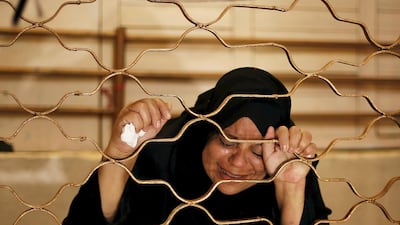JERUSALEM // Four Palestinians were shot dead on Saturday in attacks in East Jerusalem and the West Bank.
Israeli border police killed a 16-year-old Palestinian in a neighbourhood around East Jerusalem as they stopped him for questioning.
Police claimed the teenager had been walking in “a suspicious manner” and drew a knife, trying to stab the officers when he was stopped.
Israel also killed two Palestinians in the flashpoint West Bank city of Hebron, where about 500 Jewish settlers live in a heavily guarded enclave in the city centre surrounded by about 200,000 Palestinians.
In the first incident, Jewish settlers attacked an unarmed man, according to a Palestinian high school student who witnessed the incident.
The Israeli military claimed that the victim tried to stab an Israeli settler, who was carrying a gun which he used to shoot and kill the victim.
Palestinian security sources identified the dead man as 18-year-old Fadel Al Kawatsmi.
A video circulated by Palestinian activists showed a young man wearing a kippa brandishing a pistol as shots rang out before Israeli soldiers moved in to pull him away from a body on the ground.
The other death in Hebron was of a Palestinian woman who was shot by an Israeli border policewoman. Israeli police again claimed that the woman had tried to stab the officer before she was shot.
Palestinian media said the victim was 16 years old.
Meanwhile, an Israeli border guard killed a Palestinian who, he said, attempted to stab him at the Qalandiya checkpoint between Jerusalem and the West Bank.
The guard shot and wounded the man, then killed him after the man tried again to stab him, the Israeli military claimed.
At least 41 Palestinians and seven Israelis have died in the violence, which was in part triggered by Palestinians’ anger over increased Jewish encroachment on Jerusalem’s Al Aqsa mosque compound.
The mounting death toll has prompted fears of a new Palestinian intifada, or uprising, like those of 1987 to 1993, and 2000 to 2005, when thousands were killed in near-daily violence.
Israeli forces have been deployed in huge numbers in Jerusalem and on Wednesday began setting up checkpoints in parts of East Jerusalem.
The United States urged leaders on both sides to help rein in the unrest.
“We are very concerned about the outbreak of violence,” president Barack Obama said in Washington.
He said it was important for Israeli prime minister Benjamin Netanyahu and Palestinian president Mahmoud Abbas and other people in positions of power to try to “tamp down rhetoric that may feed violence or anger or misunderstanding”.
US secretary of state John Kerry, who could travel to the region soon and is scheduled to meet the Israeli prime minister in Germany this week, has spoken separately to Mr Abbas and Mr Netanyahu to ask them to restore calm.
Mr Abbas has been under pressure over recent comments that some have described as incitement, and has called for peaceful protests.
But on Friday, he condemned an arson attack the night before on Joseph’s Tomb, a West Bank site which is holy to Jews.
The same day, four Palestinians were killed, one named Ayad Awawdeh, after posing as a news photographer to stab and wound a soldier outside a Jewish settlement.
As hundreds of Palestinians joined the funeral of Awawdeh in the West Bank village of Dura on Saturday, his mother said her son had “watched the news on television the whole time and exploded with anger at seeing so many horrors”.
Israel has warned that it may not hand over the bodies of those responsible for attacks to their families for burial.
The violence came after clashes in September between Palestinian youths and Israeli forces and at East Jerusalem’s flashpoint Al Aqsa mosque compound, the third holiest site in Islam.
On Friday, Israel rejected Palestinian calls for an international protection force to be deployed to quell violence around Al Aqsa.
* Agencies

